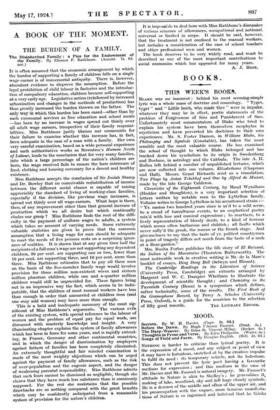BOOKS.
THIS WEEK'S BOOKS.
BLAKE was no innocent : behind his most seeming-simple lyric was a whole mass of doctrine and cosmology. " Tyger, tyger " and " Little lamb, who made thee " were in impulse, whatever they may be in effect, poetic statements of the problem of Forgiveness of Sins and Punishment of Sins. Unfortunately most commentators of Blake who tried to explain his system have been themselves neophytes in mysticism and have perverted his doctrines to their own experiences. Mr. S. Foster Damon, in William Blake, his Philosophy and Symbols (Constable), has taken the most sensible and the most valuable course. He has examined the school of thought to which Blake belonged and has tracked down his symbolism to its origin in Swedenborg and Boelune, in astrology and the Cabbala. The late A. H. Bullen left behind a number of unpublished lectures, which are now collected into one volume, Elizabethans (Chapman and Hall). Messrs. Grant Richards send us a translation, Two Plays by Anton Tchekhof and One by Alfred de Mussel, made by the late George Calderon.
Chronicles of the Eighteenth Century, by Maud Wyndham (Hodder and Stoughton), is a very important selection of letters written by notable men to the Lyttelton family. Voltaire writes to George Lyttelton in his accustomed strain :- " Yr. nasion two hundred years since is us'd to a wild scene, to a croud of tumultuous events, to an emphatical poetry mix'd with lose and comical expressions ; to murthers, to a lively representation of bloody deeds, to a kind of horrour which seems often barbarous and childish ; all faults which never sully'd the greak, the roman or the french stage. And give me leave to say that the taste of yr. politest countrymen in point of tragedy differs not much from the taste of a mob at a Bear-garden."
Mrs. Rosita Forbes publishes the life story of El Raisuni, the Sultan of the Mountains (Thornton Butterworth). The most noticeable work in creative writing is Mr. de la Mare's booklet of essays, Ding Dong Bell (Selwyn and Blount).
The Cambridge Readings in the Literature of Science (University Press, Cambridge) are extracts arranged by Margaret and W. C. Dampier Whetham to illustrate the development of scientific thought ; and Chemistry in the Twentieth Century (Been) is a symposium which defines, rather technically, some of the results. The First Book of the Gramophone Record, by Percy A. Scholes (University Press, Oxford), is a guide for the musician to the selection


















































 Previous page
Previous page